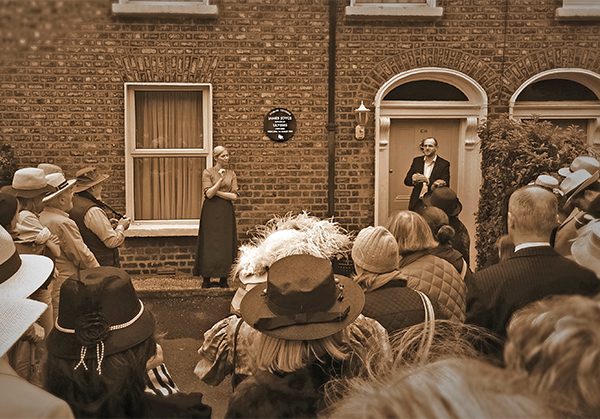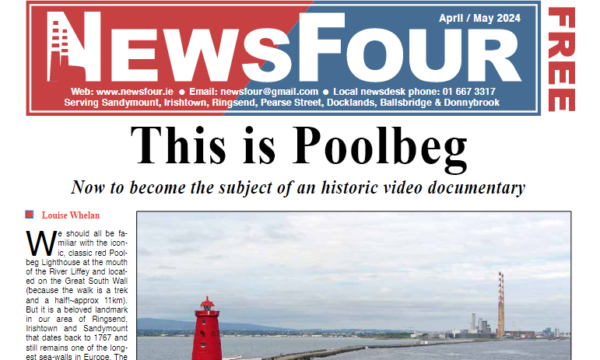
Photo by Chris Nugent.
One of the highlights of the Bloomsday festivities in Dublin was the inaugural Citizens’ Breakfast, a Bloomsday Theatre experience presented by Time Machine Events. It would have been difficult to find a more original or striking Bloomsday production this year, in a city where there were many.
Devised and adapted from James Joyce’s Ulysses by Grainne O’Kelly Nugent and Tara Derrington, the script co-mingles the ground-breaking literary story of Molly and Leopold Bloom with the real life-story of Nora Barnacle and James Joyce, which was just as ground-breaking for an Irish couple at that time.
The production featured outdoor and indoor performances and was staged in the very neighbourhood where Joyce lived when he first met Nora Barnacle, a chambermaid from Galway who worked in Finn’s Hotel, in nearby Lincoln Place.
Joyce met Barnacle on June 10, 1904, and they had their first date on June 16th. He famously chose the date of that momentous occasion in his life as the date for the setting for the novel, Ulysses, and it has since come to be known and celebrated around the world as Bloomsday.
The drama started on Shelbourne Road, near the entrance to the Aviva stadium, where the audience was introduced to James Joyce and Nora, Leopold and Molly Bloom and to the citizens of Ulysses.
The impression of being transported back in time was created by an extraordinary group of extras and heightened by the audience, many in period dress, who effortlessly became part of the action. Theatre scenes were performed along the street as they made their way along Shelbourne Road, where Joyce rented the front upstairs room of No. 60 for a short period in 1904, then on to Beggar’s Bush, and finally to The Chophouse.
It was from No. 60 Shelbourne Road that Joyce ventured forth for his momentous liaison with the woman who would become the love of his life and who would inspire him to write, amongst other things, one of the greatest characters in English literature, Molly Bloom.
At The Chophouse a truly wonderful performance from the principal actors unfolded. Again, the audience became part of the story, noisily tucking into traditional Bloomsdays breakfasts as Leopold Bloom ruminates about food, life and longing.
As the two principal actors moved amongst the breakfasting audience, they cleverly conveyed a feature that is central to the book; much of dialogue is internal and at times it felt as if Molly and Nora, Leopold and Jim, were walking around inside your head thinking their thoughts. Quite an achievement in a packed room!
Fiona Browne conveyed the earthy sexiness and humour of Nora and of Molly. Her training in mime and physical theatre lent itself to her performance and she made it plain to see why these powerfully sensual women inspired such desire in the men in their lives. She also has a wonderful singing voice.
Damien Devaney delivered tour-de-force performances as James Joyce and Leopold Bloom. He artfully switched between the two characters throughout the play and stepped back from both to deliver equally convincing performances as some of the minor characters in the book, including Lord Cameron, The Citizen and Father Corrigan.
Following the earlier of two performances, NewsFour spoke to the Producer, Grainne O’Kelly Nugent, and the Director, Tara Derrington. They explained that they wanted to bring Joyce, and in particular Ulysses, to an audience that may never have attempted to read his words or who have been put off his work by some of the highfalutin performances that are commonplace in Dublin, the words of Leopold Bloom being bellowed at audiences in loud theatrical voices from on high.
To accomplish this they first spoke to the people who now live and work in the places that Joyce frequented before he left Ireland to live with Nora on the Continent.
They wanted to know how Joyce is perceived and how much regular Dublin citizens really know about him. This knowledge was incorporated into the play, which set out to be accessible to ordinary people, the audience Joyce had in mind when he wrote the book, the kind of people he wrote it about.
They achieve their aim in spades. Speaking to some members of the audience after the performance, they had only good things to say about the production. All of it, the story, the wonderful harp music, performed by Gloria Birardi, the performances of Fiona Browne and Damien Devaney, and in particular the extraordinary performances of the extras, who added something special to the mise-en-scène; kudos to Chris Nugent for his visionary stage and production management.
Chris Hancock, who lives in the area, really enjoyed the production saying, “I thought the writing was really great, the actors and extras were brilliant.”
Fionnula Walsh and her friend Nora Lowe were both very happy to have been part of such an exciting event. Walsh exclaimed: “Everything was fantastic from start to finish. It was great fun and very interesting for the less well-read.”
“It was a most enjoyable morning with a wonderful breakfast,” added Lowe.
It would be a shame if this great production is not more widely performed. If it returns next year, NewsFour heartily recommends that you see it.
By Jennifer Reddin



